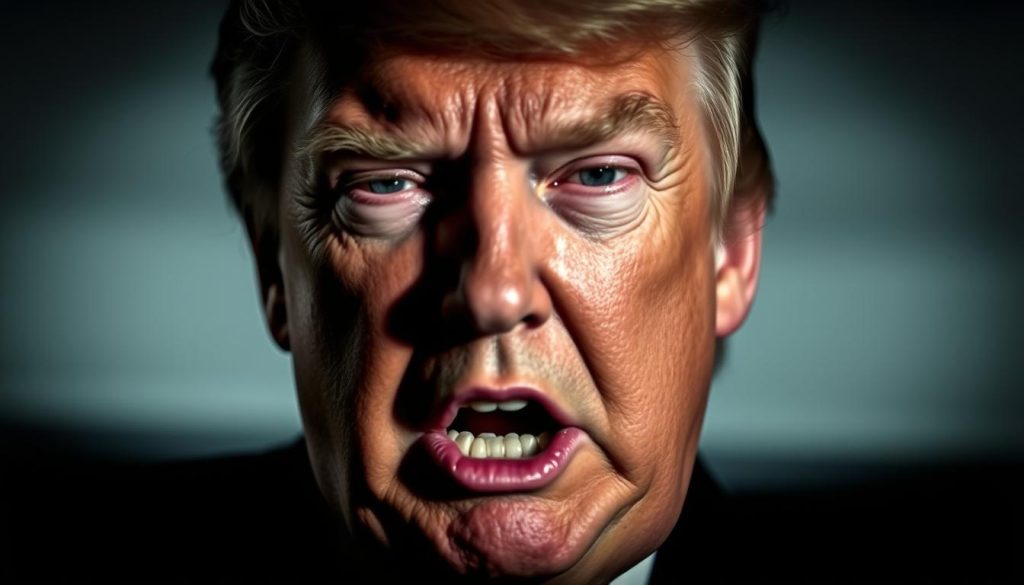In a shocking moment caught on camera, President Trump used explicit profanity while expressing frustration over the ongoing conflicts between Israel and Iran. As he left the White House, Trump told reporters that the two countries were “fighting so long and so hard that they don’t know what they’re doing.”
This unprecedented incident marks a significant departure from traditional presidential communication norms, where such language is typically avoided in public forums. The outburst highlights the escalating tensions in the Middle East and the administration’s efforts to broker peace between the warring nations.
Key Takeaways
- The incident showcases President Trump’s unfiltered communication style during times of international crisis.
- The administration’s involvement in attempting to broker peace between Israel and Iran is ongoing.
- The use of explicit profanity by a U.S. president on camera is a rare occurrence.
- The incident highlights the escalating tensions in the Middle East.
- President Trump’s approach to diplomacy is often characterized by straightforward and uncompromising language.
The Explosive Moment: Trump Drops F-Bomb on Camera
In a shocking moment caught on camera, Trump unleashed a profanity-laden rant about the conflict between Israel and Iran. This incident has sparked a heated debate about diplomatic language and presidential norms.
White House Press Encounter Details
The moment occurred during a White House press encounter, where Trump was questioned about the ongoing tensions between Israel and Iran. The exchange was tense, with Trump expressing his frustration at the situation.
Trump’s Exact Words About Israel and Iran
Trump’s exact words were: “We basically have two countries that are fighting so long and so hard that they don’t know what the fuck they’re doing,” he ranted. “[Iran] violated, but Israel violated it too. Israel, as soon as we made the deal, they came out and they dropped a load of bombs — the likes of which I’ve never seen before, the biggest load that we’ve seen — I’m not happy with Israel.” This quote reveals Trump’s diplomatic approach and his disappointment with both countries.
Trump’s comments suggest that he is frustrated with the actions of both Israel and Iran, and that he believes they have violated the deal made between them. This incident highlights the complexities of the conflict and the challenges of diplomatic efforts in the region.
Escalating Tensions Between Israel and Iran
Israel and Iran are embroiled in a conflict that has been gaining momentum. The recent surge in hostilities has raised concerns globally.
Weekend Bombing of Iranian Nuclear Facilities
Early Tuesday morning, Iran reportedly fired a barrage of missiles that struck an apartment complex in southern Israel, killing at least four people. The Iranian military later denied firing the munitions, claiming they did not violate the ceasefire agreement.
Missile Exchanges and Civilian Casualties
In response to the Iranian attack, Israel struck a radar base north of Tehran. This retaliatory action occurred in the early morning hours, further complicating diplomatic efforts to maintain peace. The exchanges resulted in significant civilian casualties, exacerbating the conflict.
- The conflict escalation was marked by missile exchanges and significant civilian casualties.
- Iran’s denial of responsibility for the attack did little to ease tensions.
- Israel’s response was swift, targeting a key Iranian military installation.
Trump’s Ceasefire Announcement and Aftermath
The morning hours saw a flurry of activity as Trump tried to maintain the ceasefire. Trump’s announcement on Truth Social brought a brief moment of calm, but it was short-lived.
The 12-Hour Peace Declaration on Truth Social
Trump declared a ceasefire, stating that “ISRAEL is not going to attack Iran. All planes will turn around and head home, while doing a friendly ‘Plane Wave’ to Iran.” This unusual diplomatic language was an attempt to salvage the peace agreement. The ceasefire was announced in the early morning hours, and for a brief period, it seemed effective.
Violations and Trump’s Frustrated Response
However, within hours, Israeli Defense Minister Israel Katz announced the resumption of the offensive against Iran. Trump responded urgently on Truth Social, writing “ISRAEL. DO NOT DROP THOSE BOMBS. IF YOU DO IT IS A MAJOR VIOLATION. BRING YOUR PILOTS HOME, NOW!”
Trump’s frustrated response highlighted the challenges of maintaining the ceasefire, which ultimately lasted only about 12 hours.
The “Trump F Bomb” Creates Political Shockwaves
In a surprising turn of events, President Trump’s use of profanity has become the focal point of a broader discussion on his approach to international diplomacy. The incident has sparked a wide range of reactions from the media and the public.
Media Coverage and Public Reaction
The media coverage of the incident has been extensive, with various outlets analyzing the context and implications of President Trump’s words. Public reaction has been mixed, with some defending the President’s right to express himself and others criticizing the unprofessionalism of his language.
Congressional Allies Frame Trump as Peacemaker
Despite the controversy surrounding the F-bomb incident, Congressional allies of President Trump have moved to frame him as a peacemaker. Senator Katie Britt (R-Ala.) stated on Fox News that “President Trump is going to win the Nobel Peace Prize, no doubt,” citing his efforts to bring stability to the region. This narrative has been promoted despite the fact that a ceasefire was declared just days after a military strike against Iran was ordered by President Trump.
Presidential Profanity Through History
Presidential historians have long noted the contrast between the formal language used by presidents in public and their private conversations. This distinction is crucial in understanding the context of President Trump’s recent public use of profanity.
Previous White House Hot Mic Incidents
There have been instances where presidents have been caught off guard by hot microphones, revealing a more candid side of their personalities. While these incidents are rare, they provide insight into the pressures and stresses faced by presidents.
For example, President Jimmy Carter once used strong language when discussing the Shah of Iran’s medical care in the United States, showcasing how extreme pressure can lead to uncharacteristic language.
Behind-Closed-Doors Presidential Language
In private, several U.S. presidents have been known to use profanity, including Harding, Grant, Truman, Johnson, and especially Nixon. Historians note that this behavior is not uncommon among leaders facing high-stakes decisions.
The way presidents speak in private versus public settings can reveal aspects of their character and leadership style. Understanding this dynamic is essential in assessing the significance of Trump’s public profanity.
Breaking Presidential Norms: What Trump’s Language Signifies
When Trump’s profanity was caught on a hot mic, it ignited a conversation about the changing landscape of presidential norms. Trump’s language reflects his unconventional approach to diplomacy, particularly in the context of the Israel-Iran conflict.
According to Riley, “This is a president that has seldom felt bound by the normal constraints of the office, and the use of profanity is typically one of those constraints.” This observation highlights Trump’s consistent pattern of breaking presidential norms throughout his administration.
The breakdown of the ceasefire within hours of its announcement, despite Trump’s efforts, underscores the complex challenges of Middle East diplomacy. The humanitarian impact of continued conflict, including missile strikes on civilian facilities and military bases, has been severe, affecting many people caught in the crossfire.
Experts are divided on whether Trump’s unorthodox approach will have any effect on the diplomatic process. As the world watches, the implications of targeting nuclear facilities and the future course of the conflict remain uncertain. Trump’s frustrated profanity ultimately reflects the genuine challenges of brokering peace in a region where ceasefire violations have become normalized.
The incident has sparked a debate about the potential shift in presidential communication norms. As the administration navigates the intricate web of international diplomacy, the world waits to see the outcome of Trump’s efforts to bring peace to the warring countries.
FAQ
What was the context of President Trump’s F-Bomb incident?
The incident occurred during a press encounter at the White House, where President Trump was discussing the recent tensions between Israel and Iran.
What did President Trump say about the ceasefire between Israel and Iran?
President Trump announced a 12-hour ceasefire on Truth Social, stating that the two countries had agreed to stop exchanging missiles and attacks on nuclear facilities.
Were there any reported violations of the ceasefire?
Yes, there were reports of violations, which led to a frustrated response from President Trump, who expressed his disappointment with the situation.
How did the media cover President Trump’s F-Bomb incident?
The media extensively covered the incident, with many outlets framing it as a shocking moment that highlighted the intense emotions surrounding the Israel-Iran conflict.
How did Congressional allies react to President Trump’s peacemaking efforts?
Congressional allies framed President Trump as a peacemaker, citing his efforts to broker a ceasefire between Israel and Iran as a significant achievement.
Has profanity been used by previous Presidents in the White House?
Yes, there have been previous instances of Presidents using profanity, both in public and behind closed doors, although such incidents are often not widely reported.
What does President Trump’s use of profanity signify about his presidency?
President Trump’s use of profanity is seen by some as a sign of his willingness to break with traditional presidential norms and speak his mind, even if it means using unconventional language.



